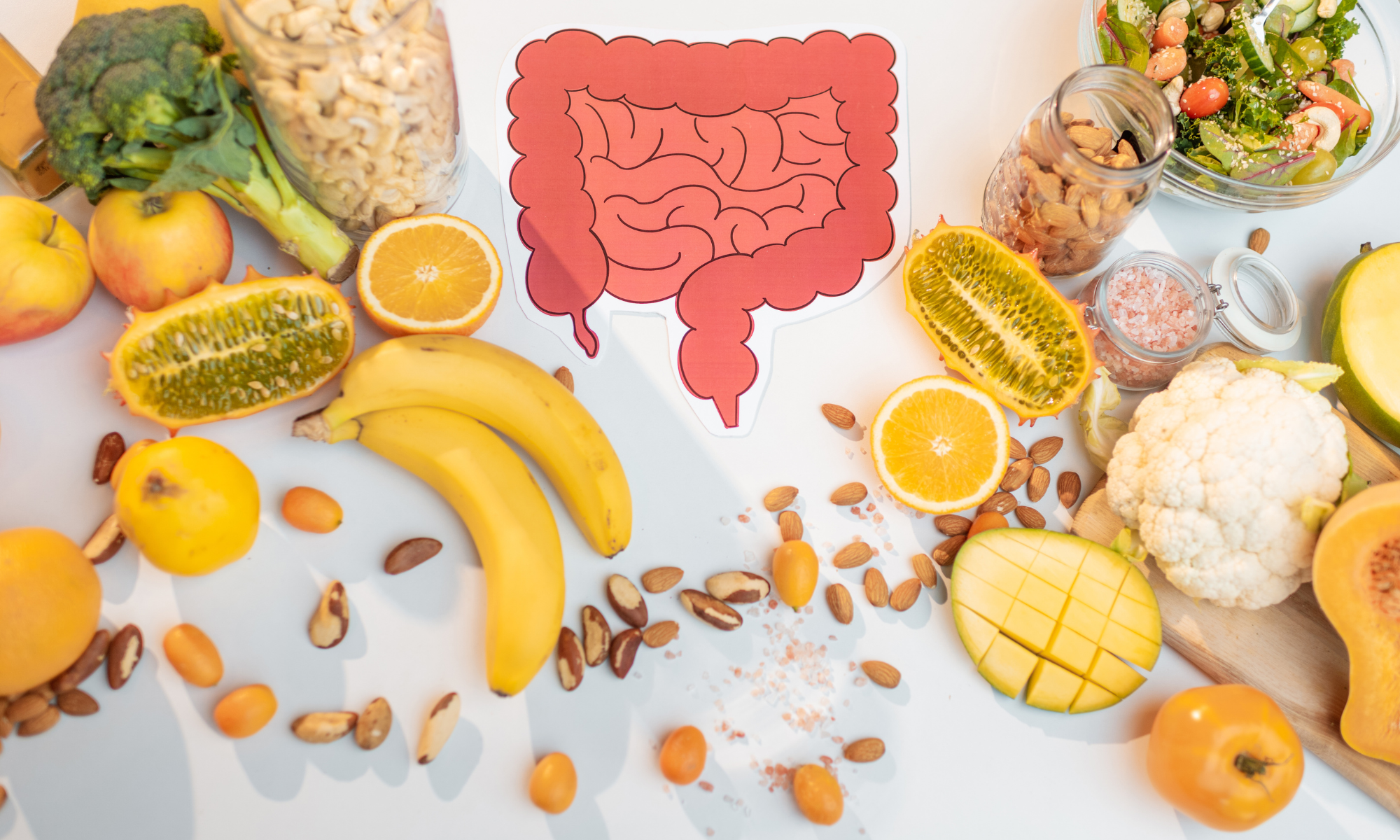6 Best Foods for Digestive Health: A Gut-Friendly Grocery List

KEY TAKEAWAYS
- Digestive health directly influences energy levels, immune function, and overall wellness, making it essential to prioritize gut-friendly foods.
- Fiber-rich foods and probiotics work synergistically to support gut balance, regularity, and the growth of beneficial bacteria.
- Hydration plays a critical role in digestive function, helping to prevent constipation and aid in smooth digestion.
- Avoiding processed foods and artificial sweeteners reduces strain on the digestive system and promotes a healthy gut microbiome.
- Incorporating a variety of fruits, vegetables, lean proteins, and prebiotic foods ensures a diverse and nutrient-rich diet that supports digestive health.

Understanding Digestive Health

Digestive health is the foundation of overall wellness, directly influencing energy levels, mood, and even immune function. The digestive system is a complex network of organs working together to break down the foods you eat, absorb essential nutrients, and eliminate waste efficiently. When this system operates smoothly, it not only supports physical health but also fosters mental clarity and emotional stability. However, disruptions in digestive health, such as poor diet choices or stress, can lead to bloating, fatigue, irregular bowel movements, and a weakened immune system.
A well-balanced diet is one of the most effective ways to support your digestive system. Certain foods play a critical role in nourishing the gut lining, encouraging the growth of beneficial bacteria, and maintaining the balance of the microbiome—an ecosystem of microorganisms essential for digestion and overall health. Additionally, these foods help reduce inflammation, improve nutrient absorption, and promote regularity.
Understanding how to care for your digestive health is more than just preventing discomfort; it’s about empowering your body to flourish. Incorporating gut-friendly foods into your meals can enhance your overall quality of life, fostering better digestion, increased energy, and long-term resilience.
"Digestive health is the cornerstone of overall wellness, impacting everything from energy levels to immune function."
6 Best Foods for Digestive Health

Eating the best foods for digestive health can help support gut function, reduce discomfort, and boost overall wellness. Including gut-friendly options in your diet ensures that your digestive system is well-equipped to process nutrients and maintain a healthy balance of bacteria. Below are six categories of foods that are highly beneficial for digestive health, each playing a unique role in promoting optimal gut function.
1. Fiber-Rich Foods
Fiber is essential for digestive health, aiding in regular bowel movements and preventing constipation. Soluble fiber, found in oats and legumes, absorbs water to form a gel-like substance that softens stool. Insoluble fiber, found in whole grains and vegetables, adds bulk and helps food pass through the digestive tract efficiently. Both types are critical for maintaining a healthy gut microbiome.
Examples of fiber-rich foods:
- Whole grains: Brown rice, quinoa, and whole wheat bread.
- Legumes: Lentils, chickpeas, and black beans.
- Vegetables: Broccoli, carrots, and Brussels sprouts.
- Fruits: Apples, pears, and raspberries.
Consuming a variety of fiber-rich foods supports gut bacteria and encourages a balanced digestive process. This is a key step in maintaining long-term digestive health.
2. Probiotic-Rich Foods
Probiotics are live microorganisms that promote the growth of healthy bacteria in your gut. These beneficial bacteria help balance the digestive system, improve nutrient absorption, and reduce issues like gas and bloating.
Examples of probiotic-rich foods:
- Yogurt: Choose unsweetened varieties with active cultures.
- Kefir: A fermented dairy drink packed with probiotics.
- Sauerkraut and kimchi: Fermented vegetables that support gut flora.
- Miso: A fermented soybean paste used in soups and marinades.
Regularly incorporating probiotics into your diet fosters a robust gut microbiome and enhances overall digestive efficiency.
3. Prebiotic Foods
Prebiotics are non-digestible fibers that feed the beneficial bacteria in your gut. They act as fuel for probiotics, ensuring that healthy bacteria thrive and maintain balance.
Examples of prebiotic foods:
- Garlic and onions: Contain inulin, a powerful prebiotic.
- Bananas: Especially when slightly green, provide resistant starch.
- Asparagus: High in fiber and prebiotic compounds.
- Chicory root: Commonly found in herbal teas and coffee alternatives.
Including prebiotics in your meals creates a symbiotic environment where probiotics can flourish, further improving gut health.
4. Lean Proteins
Lean proteins are gentle on the digestive system while providing essential amino acids for tissue repair and overall health. They are particularly helpful for those managing gastrointestinal discomfort, as they are less likely to cause bloating or irritation.
Examples of lean proteins:
- Skinless poultry: Chicken and turkey.
- Fish: Salmon, cod, and haddock.
- Tofu and tempeh: Plant-based sources of protein.
- Eggs: A versatile and easy-to-digest option.
Opting for lean proteins can help maintain energy levels without straining your digestive system, supporting a balanced diet.
5. Best Breakfast Foods for Digestive Health
Breakfast is a critical opportunity to set your digestive system up for success. Choosing the right foods can help stimulate digestion and provide lasting energy.
Examples of gut-friendly breakfast options:
- Overnight oats: Combine oats with almond milk and chia seeds for fiber and omega-3s.
- Smoothies: Blend spinach, banana, and kefir for a probiotic boost.
- Whole-grain toast: Top with avocado for healthy fats and prebiotic benefits.
- Greek yogurt with berries: A probiotic-rich meal to fuel your morning.
Starting your day with these nourishing options can improve gut health and keep your digestive system on track.
6. Best Fruits and Vegetables for Digestive Health
Fruits and vegetables are rich in vitamins, minerals, and antioxidants that support the digestive system. They also provide fiber and hydration, which are crucial for regularity.
Examples of digestive-friendly fruits and vegetables:
- Fruits: Papaya, pineapple, and kiwi contain digestive enzymes.
- Vegetables: Spinach, zucchini, and cucumber offer hydration and fiber.
- Berries: Strawberries and blueberries are high in antioxidants.
- Root vegetables: Sweet potatoes and carrots are nutrient-dense and easy to digest.
Including a colorful variety of fruits and vegetables in your diet ensures that your digestive system gets the nutrients it needs to function optimally.
Including the best foods for digestive health in your meals is an impactful way to support gut function and overall wellness. From fiber-rich grains to probiotic-packed options, these choices work together to enhance digestion, reduce discomfort, and nourish the gut microbiome. By making intentional, nutrient-dense selections, you can create a balanced diet that promotes regularity, improves nutrient absorption, and fosters a healthy digestive system. Prioritizing these foods is a powerful step toward long-term gut health, helping you feel energized, comfortable, and in control of your well-being.
How to Incorporate Gut-Friendly Foods into Your Diet

Incorporating gut-friendly foods into your meals is a transformative step toward better digestive health and overall well-being. With practical strategies, it’s simple to integrate these nutrient-dense choices into your routine, whether you’re preparing meals at home, planning snacks, or dining out. Making intentional decisions about what you eat can have a significant impact on digestion and overall wellness.
"A balanced lunch might include grilled chicken paired with a quinoa salad featuring fresh spinach and creamy avocado."
Start Your Day with a Gut-Friendly Breakfast
Breakfast provides the perfect opportunity to kickstart your digestive system. Options rich in probiotics, fiber, and prebiotics make for a nourishing start to your day. For example, blending kefir with spinach and banana creates a nutrient-rich smoothie that supports gut health. Overnight oats prepared with chia seeds and almond milk offer a fiber-packed meal, while a Greek yogurt bowl topped with fresh berries and a drizzle of honey supplies probiotics and antioxidants. These breakfast choices are not only quick and easy but also ensure your digestive system begins the day well-supported.
Make Snacking Healthy and Gut-Focused
Snacks are an excellent way to provide your digestive system with consistent nourishment throughout the day. Fresh vegetables paired with hummus deliver both fiber and prebiotic benefits, while a handful of nuts, seeds, and dried fruits create a balanced and portable option. Fruits like apples and pears are also fiber-rich and easy to include in your routine. Making thoughtful snacking choices keeps your energy levels steady and supports digestive health without adding unnecessary strain to your system.
Prioritize Balance at Every Meal
Every meal presents an opportunity to support your gut health by combining lean proteins, whole grains, and a variety of fruits and vegetables. A balanced lunch might include grilled chicken paired with a quinoa salad featuring fresh spinach and creamy avocado. For dinner, consider baked salmon served alongside roasted sweet potatoes and steamed broccoli. Comforting options like soups and stews, made with lentils, root vegetables, and spices such as turmeric, provide a satisfying and nourishing meal. Structuring meals with these principles ensures your digestive system gets the diverse nutrients it needs to perform at its best.
Stay Hydrated to Support Digestion
Adequate hydration is essential for optimal digestion. Drinking plenty of water throughout the day keeps your digestive processes running smoothly and helps prevent constipation. Herbal teas such as ginger or peppermint can offer additional benefits, soothing the digestive tract and complementing your gut-friendly food choices. Maintaining proper hydration supports not only digestion but also your overall health.
Experiment with New Recipes and Flavors
Adding variety to your meals with creative recipes can make eating for gut health enjoyable and sustainable. Fermenting your own sauerkraut or incorporating miso paste into soups are excellent ways to explore new flavors while supporting your gut microbiome. Global cuisines like Mediterranean or Asian dishes often include naturally gut-friendly ingredients, offering inspiration for meals that are both delicious and nutrient-rich. Experimenting with new recipes keeps your diet exciting while ensuring your digestive system remains well-nourished.
Taking a thoughtful and balanced approach to integrating gut-friendly foods into your routine fosters a supported and resilient digestive system. These simple yet impactful strategies make it easier to maintain digestive health while enjoying flavorful and fulfilling meals.
Foods to Avoid for Better Digestive Health

While focusing on the best foods for digestive health is essential, it’s equally important to recognize which foods can disrupt gut function. Certain items can cause inflammation, bloating, or discomfort, ultimately hindering your digestive system’s ability to perform optimally. Avoiding or minimizing these foods can significantly improve your overall digestive health.
- Highly processed foods: Chips, sugary cereals, and fast foods are often loaded with preservatives, artificial additives, and low-quality fats that can irritate the gut lining.
- Fried foods: Foods cooked in excessive oil, such as French fries and fried chicken, are difficult to digest and can slow down gut function.
- Sugary beverages: Sodas and energy drinks can upset the balance of gut bacteria, promoting harmful microbial growth.
- Excessive alcohol: Drinking too much alcohol can damage the stomach lining and disrupt the gut microbiome.
- Dairy products: For individuals who are lactose intolerant, milk, cheese, and cream can trigger bloating, gas, and diarrhea.
- Artificial sweeteners: Substitutes like aspartame and sucralose can alter gut bacteria and may lead to digestive issues in some people.
Reducing your intake of these foods helps alleviate strain on your digestive system, paving the way for healthier digestion and improved gut balance. Making intentional food choices empowers your body to function optimally and promotes long-term well-being.
Prioritizing the best foods for digestive health can transform how your body feels and functions daily. Incorporating fiber-rich grains, probiotic-packed options, and hydrating fruits and vegetables into your meals helps nourish your gut and enhance digestion. At the same time, reducing your intake of processed foods, excessive sugars, and other irritants promotes balance and reduces digestive discomfort.
Creating a gut-friendly diet doesn’t have to be overwhelming. Simple changes, such as starting your day with a probiotic-rich breakfast or swapping sugary snacks for nutrient-dense alternatives, can make a significant impact. These small but meaningful adjustments pave the way for improved digestion, greater energy, and overall well-being, empowering you to live your healthiest life.
For those seeking a more personalized approach to digestive health and overall wellness, Roots Nutrition offers expert-curated supplement packages tailored to your unique needs. Founded by Dr. Romeo Brooks, a pioneer in holistic health, Roots Nutrition combines decades of expertise in natural healing with scientifically-backed solutions. Discover how our natural supplements can support optimal digestion, detoxification, and vitality—empowering you to achieve your health goals.Common Questions About Best Foods for Digestive Health
What are the best foods for digestive health?
The best foods for digestive health include fiber-rich options like whole grains and vegetables, probiotic-packed choices such as yogurt and kimchi, and prebiotic foods like garlic and onions. These help balance your gut microbiome, promote regular bowel movements, and enhance nutrient absorption.
How can I improve my digestion naturally?
Improving digestion naturally involves eating a balanced diet that includes lean proteins, fresh fruits, and vegetables while staying hydrated and limiting processed foods. Incorporating foods rich in probiotics and prebiotics further supports gut health by fostering beneficial bacteria.
What breakfast foods are good for digestion?
The best breakfast foods for digestive health include smoothies with spinach and kefir, overnight oats made with chia seeds, and Greek yogurt topped with fresh fruit. These options are packed with probiotics, fiber, and nutrients to support healthy digestion throughout the day.
Why should I avoid processed foods for better digestive health?Processed foods often contain preservatives, artificial additives, and low-quality fats that disrupt gut bacteria and irritate the digestive tract. Opting for whole, unprocessed foods helps protect your gut lining, maintain microbiome balance, and reduce digestive discomfort.
Can hydration improve my digestive health?
Yes, staying hydrated is essential for digestion. Water helps soften stool, prevent constipation, and keep your digestive system functioning smoothly. Adding herbal teas like ginger or peppermint can also provide soothing benefits for the digestive tract.





